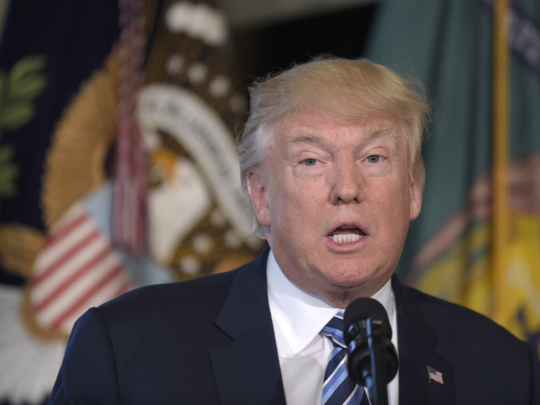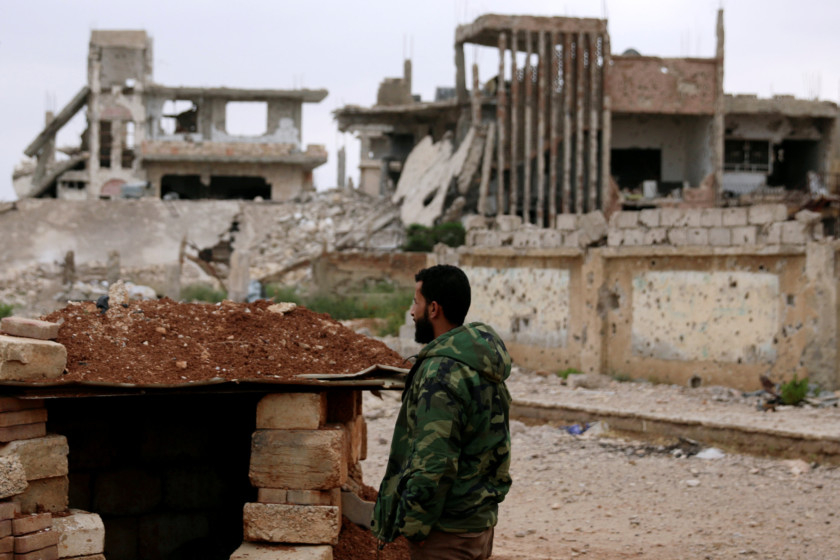
As the struggle for power unfolds in Syria, the United States has a crucial role to play.
In its first months, the Trump administration has concentrated primarily on the fight against Daesh (the self-proclaimed Islamic State of Iraq and the Levant) in and around the city of Raqqa, where US- and Turkish-supported Arab and Kurdish fighters have been slowly but surely advancing on the capital of the terrorists’ self-declared caliphate. Meanwhile, Washington has largely ignored Idlib, where the bulk of the Syrian rebels are massed and preparing for an existential fight for the survival of the revolution.
Former Syrian prime minister Riyad Hijab, the head of the opposition’s High Negotiations Committee, told me that there are tens of thousands of opposition fighters and hundreds of thousands of internally displaced civilians crowded into Idlib. This is the result of the Al Assad regime’s years-long strategy to assemble all his enemies — including US-backed rebels and extremists — in one place.
“Al Assad’s plan was to gather all the fighters, to push them away from their towns and make them gather in Idlib and that was on purpose,” he said. “Al Assad’s plan is to urge the international community and the United States to kill these people.”
The United States has been conducting limited strikes against Al Qaida’s affiliate in Idlib, now called Jabhat Fatah Al Sham (formerly the Al Nusra Front), which has a significant presence on the ground. Meanwhile, however, the administration has also cut off all aid to moderate groups fighting in Idlib, according to Hijab, placing them at a disadvantage as they struggle to maintain credibility among the civilian population.
Aid groups warn that up to 1.5 million civilians could face a humanitarian catastrophe in Idlib if the Al Assad regime begins bombarding the province on a large scale, causing a huge flow of refugees into Turkey and Europe and resulting in devastation and suffering on a scale many times greater than what was seen during last year’s siege of Aleppo.
‘Inevitable’
“An Al Assad regime campaign in Idlib is inevitable,” said Charles Lister, senior fellow at the Middle East Institute. “When exactly it will happen we don’t know, but the US needs to be prepared for that.”
Stretched thin after six years of war, the Syrian army cannot take Idlib through conventional means. That’s why Al Assad is using weapons of terror, such as nerve gas, to break the will of the civilians before the battle there begins in earnest. When the ground war erupts, a thick stew of Shiite militias, Hezbollah fighters, Afghan mercenaries and Iranian Revolutionary Guard soldiers, all covered by Russian air power, will be ready to take on the regime’s adversaries.
Despite the risks and challenges, the best option for the United States is to re-engage with those rebel groups on the ground that are most closely aligned with US objectives and give them the money, arms and training necessary to defend Syrian civilians from the onslaught to come, said former State Department Syria official Frederic Hof, now at the Atlantic Council.
There are units on the ground with which we have had relationships for years. “These units are fighting a three-way battle right now, against the regime, Al Qaida and Daesh. They need our support.”
Doing so would not only save Syrian civilian lives, but would also raise the cost for Al Assad, Russia and Iran of laying waste to Idlib. If the United States provided some rebels with anti-aircraft capabilities, such as man-portable air-defence systems, it could make Moscow think twice before bombing the hospitals and schools that the people of Idlib depend on for a semblance of normal life.
Crucially, the United States has an interest in preventing Al Assad from achieving his primary goal, which is to force the international community into a binary choice between supporting his government or the extremists. The Obama administration recognised that imperative, but mismanaged its Syrian opposition support programmes to such a degree that they were counterproductive.
The Trump administration may have deterred Syria from using chemical weapons in Idlib, but that is only one of the cruel and indiscriminate tools Al Assad is using to terrorise the population, and his determination to take back Idlib persists. If Trump truly believes in preventing slaughter in Syria, he must instruct the US government to turn its attention to Idlib before it’s too late.
— Washington Post
Josh Rogin is a columnist for the Global Opinions section of The Washington Post. He writes about foreign policy and national security.









